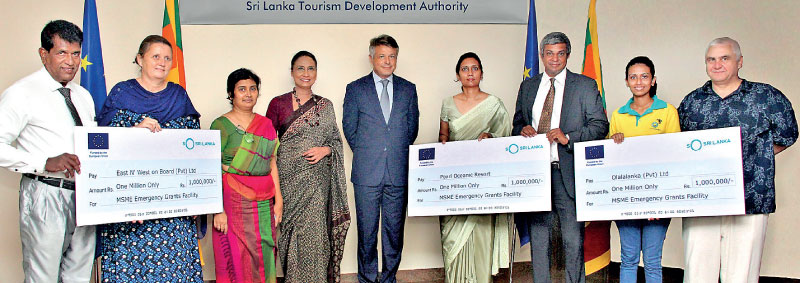Wednesday Feb 25, 2026
Wednesday Feb 25, 2026
Monday, 25 April 2022 02:01 - - {{hitsCtrl.values.hits}}

The Delegation of the European Union (EU) in Sri Lanka and the Sri Lanka Tourism Development Authority (SLTDA) awarded the first three grants – worth Rs. 1 million each – to small tourism enterprises to help them accelerate their post COVID recovery and build a stronger base for growth as tourists start returning to the country.
Grants will be disbursed to up to 60 small and medium enterprises (SMEs) over the next two months, under the EU-funded ‘Tourism Resilience Project’ (TRP). The tourism industry has been gradually emerging from the COVID-19 pandemic, but is now being affected by the Russian invasion of Ukraine and by the ongoing crisis in the country. Many SMEs have been slow to recommence their businesses due to a lack of funding. The grants are expected to help the SMEs resume their operations, be better positioned to take advantage of the resurgence in tourism and to become more resilient in the future.
The EU Delegation in Sri Lanka Ambassador Denis Chaibi speaking at the event to hand over the first grants said: “Small enterprises in the tourism sector were hit the hardest by the pandemic and needed support on multiple fronts, including grant funding. The current difficult situation in the country and Russia’s invasion of Ukraine is pushing local tourism industry yet into another phase of uncertainty. Therefore, we are working together with the SLTDA to put in place a series of activities for businesses to re-establish their operations in the short term and build a stronger base for the future growth. This includes access to finance, business incubation, and supply chain integration to help build a more resilient, sustainable, and safety conscious industry”.
SLTDA Chairperson Kimarli Fernando said: “There are over 550,000 people, directly and indirectly, engaged in the tourism industry — most of them working in SMEs and over three million dependent on tourism. We took a proactive approach from the start of the pandemic by putting in place measures to mitigate the challenges faced by the industry. The EU has supported us in this process, helping us jointly develop a wider program to build resilience in the industry and support the development of authentic signature experiences.”
Over 280 grant applications were received from tourism SMEs across the country and were subject to a multi-level screening process, before being shortlisted for the funding. Several criteria were put in place to qualify, including the size of the business, the number of employees, and their plan to regrow their businesses and retain staff. SMEs were also evaluated on their commitment to environmental sustainability.
The grants are part of the EU’s 5.7 million euro (Rs. 1.3 billion) investment in support of Sri Lanka’s tourism recovery after the COVID-19 pandemic. The Tourism Resilience Project (TRP) is one of the interventions under this larger EU’s support package. Workforce and enterprise capacity-building projects are key components of the TRP project to ensure staff retention and attract back lost talent, upskilling, and foster a start-up culture in existing and new tourism destinations in the island.